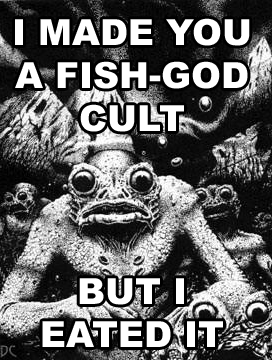main: April 2008 Archives

- How can any novel as widely read as The Catcher in the Rye be a "cult book"? L. Ron Hubbard's work is certainly cultish; ditto Ayn Rand's. Ah, but aren't they widely read, too? Of course, but they are completely humorless and consider no perspective to be justified other than their own -- sure signs of the cult mind. After giving up any real attempt at defining a "cult book" -- akin, one suspects, to distinguishing a cult from a sect from a religion -- the Telegraph takes a shot anyway at the "50 best cult books." But ... but The Confederacy of Dunces? In that case, "cult" would seem to mean "beloved novel that, for the fan, was not appreciated widely enough."
- Why, robot, as Isaac Asimov might put it. book/daddy is a little surprised that a review of a book about sex with robots never makes reference to the recent, wonderfully understated film, Lars and the Real Girl. Bianca, "the real girl," may not be an automaton, yet the question of creepiness vs. acceptance is very much the same (as is the "pathetic fallacy," the human need to anthropomorphize the inanimate). And in the film, all of this, surprisingly, is rather sweetly explored. But then, judging from its index, David Levy's Love and Sex with Robots doesn't consider Bladerunner -- or Philip K. Dick at all. Or Kokaku Kidotai (Ghost in the Shell). Or the old TV series, My Living Doll. Not a cultural study, we can say with some certainty. It does make one brief, early reference to Asimov, though -- the author of I, Robot.
- In American culture, we are all thieves, jokers and con artists now. To Lewis Hyde, Hermes is one of the generative figures in culture, a figure "of many shifts, blandly cunning, a robber, a cattle driver." For him, Hermes is "an American hero for 'the land not of natives but of immigrants, the shameless land where anyone can say anything ... the land of opportunity and therefore of opportunists ... Trickster has not disappeared. 'America' is his apotheosis; he's pandemic.'
- Thank goodness. Everyone has finally gotten their story straight. The Bush presidential think tank connected to the Bush presidential library at Southern Methodist University really isn't going to be a blatantly partisan propaganda machine. That might not be good for SMU's academic credibility. Which the school is very keen on leveraging to Ivy League status. But this means SMU has put its future reputation in hock -- to an outfit over which it has no control.
Alexander Linklater's cover story in Prospect magazine is the best single feature book/daddy has ever read on Christopher Hitchens -- a thorough tracing of his political arguments, an informed recounting of his family background (and how Hitchens insists it has little to do with his political arguments).
But there's this one, sizable oversight: There's very little on his literary criticism -- except the obvious influence of Orwell. I know, I know -- the big "flashes" in Hitchens' life, the motivating moments that he talks about when his personal insights fuse with historic occasions, have primarily been political. And who cares about novels when we're talking about '68 and the Berlin Wall and 9/11 and the blood and sand of Iraq?
Well, book/daddy cares. Sorry about that. Or actually, no, I'm not. Hitchens' writings on literature, book/daddy would argue, are often more enlightening, more thought-provoking than another one of his polemics insisting that Bush's war in Iraq remains a worthy cause -- a predictable defensive stand for Hitchens to take. But being predictable and defensive doesn't become Hitchens.
In the end, book/daddy would rather read him on Wodehouse than Wahabism.

David Mamet was never a doctrinaire lefty -- despite his recent, infamous Village Voice self-description as a "brain-dead liberal" who has come to reject the mentally moribund party line. He has been absolutely hawkish in his support of Israel, for example. His drama Oleanna was attacked by many feminists as a spurious cry of "male victimhood," and he has been a long-time member of the National Rifle Association. It's not that he was some sort of phony liberal; he simply has had a strong moral system that sometimes coincided with Democratic Party principles, and sometimes did not -- as, needless to say, many leftists do. In the '70s and '80s, he wrote brilliant, explosive dramas and film scripts, powered by masculine betrayal and a conviction that American politics and business amounted to a con job or outright theft (Glengarry Glenn Ross, Speed-the-Plow, American Buffalo, Wag the Dog). This made him, at least in his art, more or less liberal: He certainly wasn't pro-business.
But for some time, he has gravitated toward more traditional paeans to integrity and justice and even macho effectiveness -- in the understated classicism of The Winslow Boy and The Voysey Inheritance, for example, or the duty-and-honor militarism of his TV series, The Unit. Essentially, Mamet began by writing bitter moral satires (sometimes still does, given the evidence of Romance and November). But increasingly, he has turned toward expressions of the ideals that he feels are vanishing, if not already absent, from contemporary life. Pointedly, they're the qualities his previous characters lacked or despised.
The typical, Delta Force-style mission in The Unit, it should be noted, is, in effect, a con job or heist -- actions that had once been signs of cynical callousness or desperation in a business office have a moral justification, even a determined enthusiasm, in a war on terror. At the same time, The Winslow Boy and The Voysey Inheritance are actually Victorian tales of stiff-upper-lip, British family honor -- a far cry, it would seem, from his down-and-dirty hoods, near-hoods or soulless yobs. But then, Mamet has always admired professionalism of whatever ilk, even among the salesmen hustlers of Glengarry. Why else did he give Alec Baldwin's bully-boy motivational speaker one of the most memorable monologues in American cinema? These guys have to be good at what they do -- the better to display their moral failings.
Not surprisingly, conservative pundits who crowed over Mamet's party defection generally betrayed their unfamiliarity with anything of Mamet's more recent than the film version of Glengarry Glenn Ross, drawn from a play he penned nearly 25 years ago. Certainly, they don't seem to have read any of his essays.
Next up: the Atlantic runs a cover story on how women's hot flashes are responsible for global warming. Especially successful women's hot flashes. And women without children. And successful, attractive women without children who didn't hop into bed with us. What's the matter with these women?
For the Hag's little aria of well-earned scorn: Brava. You may well eclipse Jessa Crispin as our favorite, delightfully crabby female litblogger.
